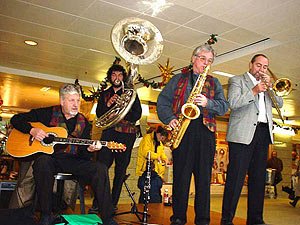 During my secondary school years, I played B-flat Clarinet in the school orchestra. I loved whatever we were asked to play - light classics, folk music, Christmas carols, even, God help me, Gilbert and Sullivan. But my heart was somewhere else. I wanted to play like Pee Wee Hunt. I wanted to play Twelfth Street Rag" the way he did. My first tutor was a formidable Jewish lady who had fled from Austria after the Anschluss. Her name was Frau Schroeder, and she was formidable both in appearance - grey hair pulled back severely and the sort of bosom you could rest a dinner service on - and in manner: don't even mention jazz in her presence. My second tutor was an ex-army musician who played in a local jazz group to make a few extra bob. Don't talk to him about jazz either: he played it but he preferred military marches.
During my secondary school years, I played B-flat Clarinet in the school orchestra. I loved whatever we were asked to play - light classics, folk music, Christmas carols, even, God help me, Gilbert and Sullivan. But my heart was somewhere else. I wanted to play like Pee Wee Hunt. I wanted to play Twelfth Street Rag" the way he did. My first tutor was a formidable Jewish lady who had fled from Austria after the Anschluss. Her name was Frau Schroeder, and she was formidable both in appearance - grey hair pulled back severely and the sort of bosom you could rest a dinner service on - and in manner: don't even mention jazz in her presence. My second tutor was an ex-army musician who played in a local jazz group to make a few extra bob. Don't talk to him about jazz either: he played it but he preferred military marches.Well into my teens, I had a yen to learn to play the piano. My mother, bless her, bought me a second-hand piano and became my teacher. The first popular piece I could play - from the dots, of course - was called "Whispering", and I can to this day remember the exact chord sequence and all the ornaments (the twiddly bits that add texture: accacciature to the cognoscenti). It's one of the few popular tunes that I never try to improvise: a sort of respect for my mother, I suppose.
An important breakthrough came when I went to work in Italy, in Naples to be precise. Because I didn't have a piano - a hard thing to slip into a suitcase - I bought a guitar and gradually became proficient in playing chord sequences, although I never had the digital dexterity to pick out much of a melody. My "tutor" was a fellow-lodger called Mario (We lived in a pensione in Via dei Mille run by an overweight pederast and his even overweighter sister). Mario was in fact Mexican, studying agrononomy at the local university. Three things about him made him special for me: his full name "Mario Antonio Acosta y Gonzalez"; his business card on which his profession was given as "Agronomo y Domador de Ostiones" (Agronomist and Ostrich Tamer); and the fact that he taught me so much about chord sequences, knowledge I could later apply to the piano and the keyboard.
In my mid-twenties, I fell in with a group of undisciplined amateur musicians and was introduced to some wild stuff, as it seemed to me then: strange time signatures like 5/4 time (Remember Dave Brubeck's "Take Five"?) and 7/4 time. They were all infected, I am sad to say, by the popular music of the day, but rock is rock, Chuck Berry was King, so I played along with them. But it was jazz that I really loved.
 The heart and soul of jazz is improvisation, that is, taking a basic melody and chord sequence and experimenting with them. You can always "play from the dots", that is, read sheet music and do exactly as it tells you to. But for a jazz musician, the melody line and its chordal structure are there to be "deconstructed". There is an immense exhilaration to be had from exploring all sorts of crazy variations and still arriving, after a dizzying switchback ride, at the proper conclusion. If you are playing solo, as I do mostly these days on my keyboard - you can go anywhere, do anything, change time signature at any moment, go for a pee, whatever you want to do. But if you are playing with other musicians - as I used to when in my 20s and 30s - you are constantly listening to the others, seeing where they are going and going there with them. The "sonnet" form of jazz is the "twelve-bar blues", providing a familiar chord sequence that is, exactly like a sonnet, the underlying structure that you must obey even though what you are doing all the time is STRUGGLING AGAINST the form, trying to break out from it, but in the end always coming back to it. Without form there is no freedom.
The heart and soul of jazz is improvisation, that is, taking a basic melody and chord sequence and experimenting with them. You can always "play from the dots", that is, read sheet music and do exactly as it tells you to. But for a jazz musician, the melody line and its chordal structure are there to be "deconstructed". There is an immense exhilaration to be had from exploring all sorts of crazy variations and still arriving, after a dizzying switchback ride, at the proper conclusion. If you are playing solo, as I do mostly these days on my keyboard - you can go anywhere, do anything, change time signature at any moment, go for a pee, whatever you want to do. But if you are playing with other musicians - as I used to when in my 20s and 30s - you are constantly listening to the others, seeing where they are going and going there with them. The "sonnet" form of jazz is the "twelve-bar blues", providing a familiar chord sequence that is, exactly like a sonnet, the underlying structure that you must obey even though what you are doing all the time is STRUGGLING AGAINST the form, trying to break out from it, but in the end always coming back to it. Without form there is no freedom.Over the years I have learned a few tricks which make my pianistic efforts seem more polished than they really are (With the onset of stiffness* in the fingers, I need all the help I can get). What does it matter? If I am happy, I fire up the keyboard and play like a lunatic, although I am fully aware that my enthusiasm far outstrips my ability. And if I am sad, I fire up the keyboard and play like a lunatic.........
Well, it's better than starting street riots, vandalising telephone kiosks and molesting dwarves on their birthday, isn't it?
*For the Germanists amongst you, savour this short poem about stiffness by Heinrich Heine:
Der Zeiten gedenk' ich
Als die Glieder gelenkig
Bis auf eins.
Die Zeit ist vorueber
Steif sind die Glieder
Bis auf eins.
1 comment:
I am glad you enjoyed it. Personally, I don't read about jazz, I just play it, which is why I will never make any progress!
Post a Comment